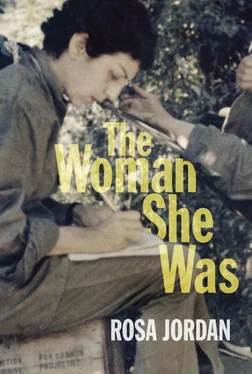She pulled into a gas station. While an attendant filled the tank, Celia walked next door to a rental car agency and looked at a road map. She had a vague notion of driving on to Manzanillo to see a street that had been turned into a memorial to Celia Sánchez, but as soon as she looked at the map, she knew she was not going to Manzanillo. Realization of her actual destination hit her with such force that she could not believe she had not known it all along.
• • •
She cleared Bayamo traffic and headed southwest, still skirting the Sierra Maestra but moving ever closer to its rugged terrain. At Bartolomé Masó, the road turned due south and Cuba’s highest mountains loomed before her. Within minutes she was surrounded by steep slopes covered with royal palms. Their straight white trunks took on a pink tinge that matched rose-coloured clouds floating in the afterglow of a sun just set. Celia would have liked to stop and take in more of the scenery, but night was just minutes away and she did not want to be driving this winding road in the dark. The Fiat complained strenuously at the precipitous climb. She slowed down, geared down, and kept climbing.
One car passed her, its door bearing the emblem of the provincial department of agriculture. It pulled into Villa Santo Domingo just ahead of her and a lone man got out. There were only a few cars in the parking lot.
Celia had changed into shorts in steamy Santiago. As she followed the khaki-clad driver of the other car to the reception desk, the cool mountain air caused her legs to prickle with goosebumps. The desk was not precisely indoors, but was set back under an overhanging apartment—the manager’s, she presumed—to protect it from the weather. Two polished wooden rocking chairs sat on either side of the unwalled reception area, inviting guests to relax and chat. The clerk, a trim young man with crew-cut hair and military bearing, greeted the man ahead of her familiarly and slid a registration card across the desk. “Bruno! What brings you back? Not another outbreak, I hope!”
“No, just a routine inspection. Can’t take chances with something capable of destroying the entire coffee industry.”
“But we got a clean bill of health over a year ago!” the clerk protested.
“I know. Like I said, it’s just a routine inspection.”
Celia understood that they were talking about a coffee pest that had hit the area, so serious that La Comandancia de La Plata had been closed to visitors and the entire mountain region quarantined for two years. The media had made much of it at the time, but there had been little follow-up.
The man named Bruno passed the registration form back to the clerk and turned to smile at Celia. “Up for the weekend?”
Celia ignored the question and asked, “Did they ever find out the origin of the…” She hesitated, unable to recall whether it had been a beetle, a moth, fungus, or what. She settled on “the pest?”
The agricultural inspector leaned on the counter, a little too obviously sizing her up. “It wasn’t a CIA plot, like swine fever, if that’s what you’re asking.”
“There was some talk of that,” Celia said, a touch defensively.
“Well, naturally. Given all the documented incidents we have of US bio-terrorism, that’s the first thing the lay public would think.” His emphasis made it clear that he did not share the lay public’s ignorance. “But this had nothing to do with the CIA. The coffee bore was in Jamaica, barely one hundred kilometres from here. It didn’t even need a human carrier; it could come in on birds. Just a question of time.”
“I see.” Celia moved up to the desk in hopes that the clerk would provide her with a registration form to end a conversation that was benign enough but had overtones calculated to impress that she did not much like. Instead, the clerk extended the discussion by joining in.
“But we were prepared, weren’t we, Bruno?”
“Totally. The campesinos in this area were all trained to identify it, so when it arrived they knew exactly what to do. We had traps, and in no time our researchers had developed effective bio-control methods. But vigilant farmers, and the education to know what they were seeing when they saw it, those were the main weapons. The minute they spotted an infected bush, they burned it.”
Traps, Celia thought. So it must have been a beetle. Or perhaps a moth. She did not ask for clarification. Instead, she asked the clerk, “You do have a room, don’t you?”
He frowned, as if the question was a difficult one. “Just you?”
“Yes, please.”
“For how many nights?”
“One.”
He consulted a list. “We have two buses coming in tomorrow; we’ll be completely full. But tonight, no problem.”
“Perfect,” Celia said quickly. “The trail up to La Comandancia will be open?”
“Oh yes.”
At last he produced the registration form. She filled it out quickly, paid for the room, and held out her hand for the key.
“I’ll show you to your cabaña,” the clerk said.
Celia smiled and kept her hand out. “That is not necessary.”
Reluctantly he handed over the key. “Are you sure?”
“Quite sure,” Celia said, supposing that cottages would be numbered and she could easily find the one with a number to match the number on her key.
“See you later,” the agricultural inspector said with hope. His eyes climbed her bare legs like beetles. Or moths. “In the bar, maybe?”
She balanced a noncommittal reply that might be mistaken for encouragement against the rudeness of no reply and opted for rude. Apparently to no avail. As she took her bag from the car, she realized with a sinking heart that he had taken a step or two toward her, probably intending to accompany her to her cottage on the pretense of looking for his own.
Just then the clerk whom she had so firmly dismissed walked out and reached for the bag. “Permit me,” he said. “The path is rough and the light is not very good.”
Whether he was aware of the other man’s intentions and did not approve or did not want to miss an opportunity for a tip Celia did not know, but she relinquished the case with relief. The other man, seeing that she would be accompanied, headed in the opposite direction toward the bar. Celia gave the clerk a grateful smile and fell in behind him.
They followed a rough sidewalk lined with sword ferns and mariposa flowers, past small citrus trees and large mahogany trees with orchids and bromeliads clinging to their trunks. Celia could hear but not see a stream gurgling somewhere below.
“How far is it to the village?” she asked for the sake of conversation.
“Just across the river. Follow the lower road to where the bridge was.”
“Was?”
“It was destroyed by a hurricane. We don’t get much wind here, but rain turned the river into a torrent. It’s back to normal now, though. You can cross on the stones. There’s a museum over there if you’re interested.”
They arrived at the cottage assigned to her and she handed him the key. He opened the door and flipped on the light.
“How far is it to the Comandancia trail head?” she asked.
“Five kilometres. You can drive that far and leave your car in the parking lot. But you must first stop at the park office for a guide. It opens at eight.”
“Gracias.” He accepted the tip with a polite nod and was gone.
Celia looked about the rustic room. They could call it a villa if they wanted, but it was barely above a campismo. In fact, she was almost certain it had been constructed for groups of young campers and other Cubans who still came by the busload to visit one of the most sacred sites of the Revolution. The only improvement that she could see was the installation of a window air conditioner, which seemed absurd in view of the altitude and shady surroundings. The temperature was very pleasant. She wound the jalousied window open and stood listening to the gurgle of the river. A mosquito flew lazily in between the glass slats and landed on her cheek. She swatted it, only to feel the bite of another on her ankle.
Читать дальше












